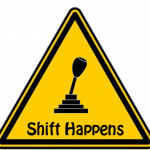I found a quote about ten years ago that I have since shared with family and friends when they were facing hard times; it goes like this: “sometimes good luck comes disguised as disaster.” Meaning that once you go through a difficult situation, whether it be financial, health-related, marital, or personal, with hindsight you realize that you’re actually glad you had to go through the tough time because you came out of it better and stronger.
With the recession still in full throttle, many people who are suffering financially may not be able to see the positive long-term effects of this struggle (yet) in their personal lives. But I am watching this national financial disaster with interest, because I am hoping that one of the outcomes is a new mind-set in regards to materialism. Over the last century, we have become a nation of consumers. If you told people four years ago to try to save more and spend less, they would have looked at you like you were un-American. It is very difficult to convince people to make a paradigm shift when times are good. I look at the list of consumer products that have gone from being considered luxuries to “must-haves” over the last 20 years, and it is mind-boggling. Cell phones. Computers. Disposable diapers. The list goes on and on. But if you try to tell people who are looking at ways to tighten their budgets that they don’t have to have those items, or they could substitute with less expensive versions of them, they look at you like you are asking them not to eat.
The recession is forcing people to change at a pace that is not of their own making or choosing. How can we help them adapt to this shift and make it feel like a good thing? The cultural belief is that people should be able to change whenever they want to. Nike says “Just Do It.” But personal change can’t always be accomplished as easily as advertising and self-help slogans would lead us to believe. The only example I can think of on a national scale where we were able to change a collective mind-set is with cigarette smoking. It went from being a perfectly acceptable habit in the middle of the century to pariah status today, but the shift took decades to accomplish.
If you are experiencing financial disaster, whether from job loss or just plain overspending, you might want to consider that doing things the way you used to doesn’t work anymore. From infancy to adulthood, you learned strategies to problem solve. How well you learned was dependent on two criteria; the biological “gray matter” between your ears, and your socio-cultural influences. Now you need to ramp up the first and let go of the latter. Because our culture tells us that we are what we own. A bigger house, new car, nice clothes, and other symbols of status show the world that we are successful. There is nothing inherently wrong with any of those things. On the flip side, why not use this current trend of economizing to tweak your lifestyle to see if your budget matches your personal values?
For example, do you tell people that you want to exercise more and eat healthier? How about focusing on your food budget for a few months to see if you can learn some new meals that are tasty and cheap to make, and save some dollars at the same time? Food is the largest part of your flexible expense sheet, so if you’re trying to free up $10-20 per week, that would be a good place to start. Watching less TV and taking a walk every day will be free if you use “nature’s gym,” and may eventually reduce some of your health care costs. If you start with just one line item in your budget and work it, research it, and hone it until it really feels like you are living as frugally, but personally satisfying as you can, then you can move onto the next issue. We call this scaffolding.
Scaffolding is a process that helps people learn how to make change in an orderly, sequential format. If you feel you don’t have enough background to start identifying problem areas in your budget, ask for help. Take a class. Check out books from the library and read them. Ask a friend or family member who is frugal to get you started. In the same way that your parents guided you as a child, adults can help you figure out how to manage your finances. You will gradually build a structure or framework from which to manage your resources. But don’t just ignore your problems or pretend they don’t exist. The sooner you look at everything in black and white, figure out the problem, and identify solutions the better you will feel. And when it comes to material possessions, and your inability to let go of them, think about what survivors of fires, tornadoes, and hurricanes always say after they experience a disaster. “Things can be replaced, people can’t.” This recession may feel like a disaster to you, or it might just be a blip on your radar screen. But for the first time in a long time, it’s making people look at their material goods in a new light. For me, that’s the silver lining in all of this.
Written By:
Donna Green
Ohio State University Extension
Family and Consumer Sciences Educator


